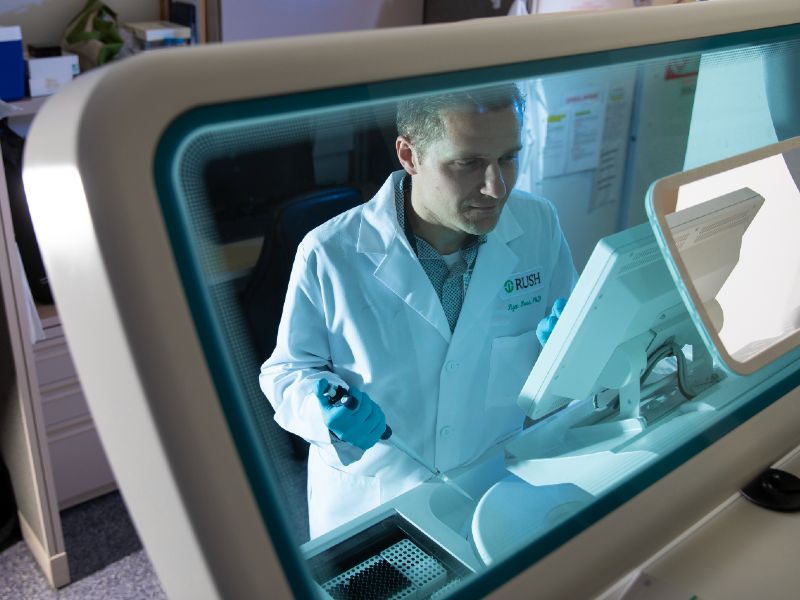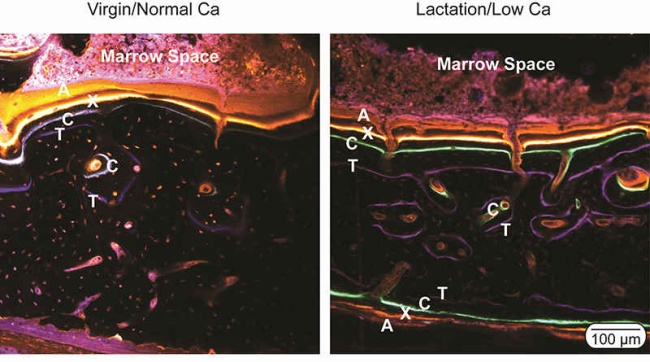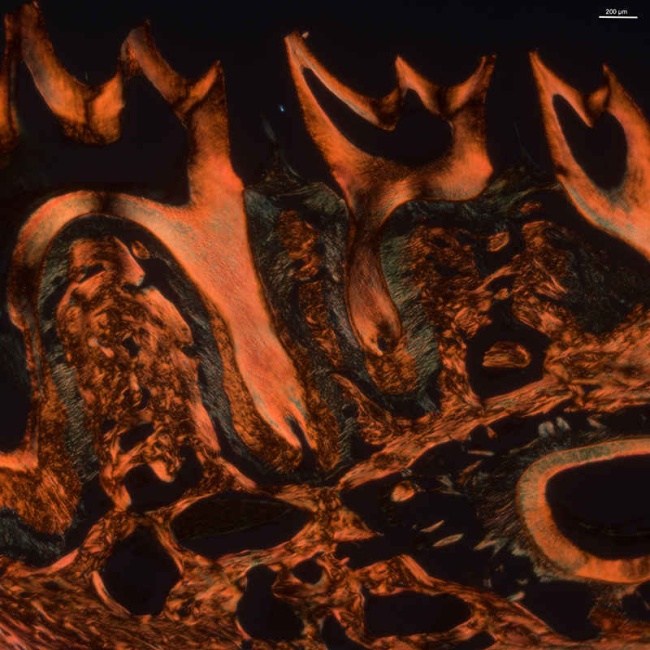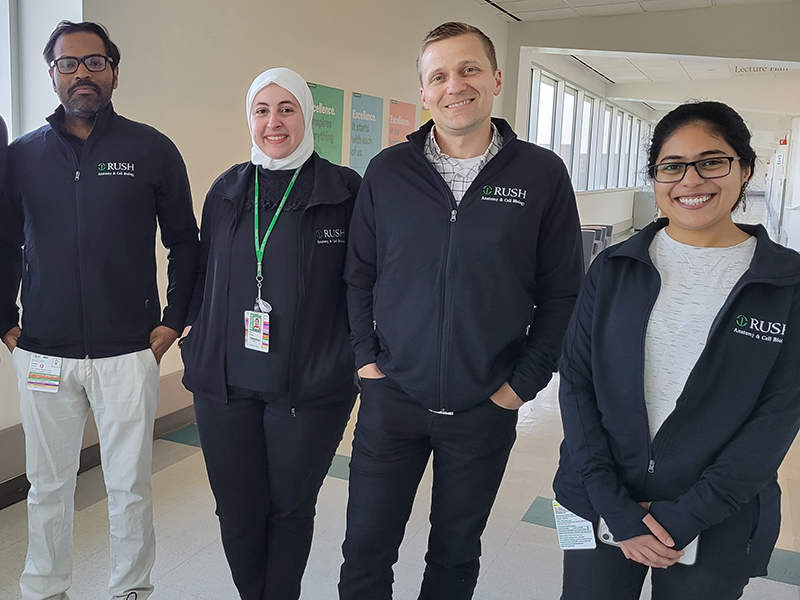
The research of Ryan Ross, PhD, is in the field of skeletal biology. We are particularly interested in the role of mineralization and other bone quality factors that influence skeletal function.
Our work

Confocal image of fluorescence labels incorporated into actively forming bone. We are leveraging our lactation/low calcium rat model to evaluate the effects of bisphosphonates on bone development and mechanics. The image is reproduced from PMCID PMC5500434.
Skeletal Mineralization. Mineralization is the final step in the bone formation phase, providing the skeleton with its characteristic strength. Additionally, the mineral within the bone provides an important ion reserve to maintain the necessary calcium and phosphate for numerous biological processes. Our lab is interested in understanding the process of mineralization. Our efforts in this space include investigating the contribution of sclerostin to the regulation of mineralization and phosphate homeostasis specifically in X-linked hypophosphatemia (XLH). More recently, we have begun investigating the potential contribution of impaired skeletal mineralization and cellular activity to the development of atypical femoral fractures (AFFs). AFFs are a rare side effect of long-term treatment with osteoporosis medications, particularly bisphosphonates. The development of AFFs has had a negative effect on osteoporosis drug adherence, as the risk of these rare, but devastating fractures has led people to halt their treatments. We are investigating both the mechanisms associated with AFFs and testing treatment options to reverse the negative effects of bisphosphonates on bone in collaboration with Drs. Thomas Andersen at the University of Southern Denmark and Joseph Wallace at IUPUI.

Representative micro-computed tomography images of trabecular bone microarchitecture and trabecular thickness from rats exposed to in utero antiretrovirals. Image courtesy of Abhaya Sridhar.
Skeletal (and Other Metabolic) Effects of HIV and Antiretrovirals. Advances in antiretroviral treatments has significantly extended the lifespan of people living with HIV (PLWH). However, as PLWH age, they face an increased prevalence and earlier onset of a variety of age-related comorbidities, including osteoporosis and fractures. We are working to better understand the relative contribution of HIV viral factors and antiretrovirals themselves on the skeleton using cells, novel mouse models, and data obtained from PLWH enrolled in a multi-site cohort study. Newer antiretrovirals formulations are less toxic to the skeleton but appear to promote changes in adiposity and increase the risk for metabolic syndrome onset. We’ve established a bone and fat hormonal crosstalk in PLWH and are working to evaluate the mechanisms and determine whether the hormonal connection between these two tissues are dependent on antiretroviral class and therefore explain the relative contribution of antiretrovirals to metabolic complications in PLWH. Finally, antiretrovirals have substantially reduced the risk of maternal to fetal transmission of HIV. However, the developing fetuses are now exposed to antiretrovirals and HIV-related factors throughout gestation and breast-feeding. We are currently investigating whether the perinatal exposure to antiretrovirals and HIV impairs bone development.
Healthy Musculoskeletal Aging in People Living with HIV. Thanks to advances in antiretrovirals, people living with HIV (PLWH) are living longer lives. However, the risk of early comorbidity development remains higher than in people living without HIV. Within the MWCCS cohort (https://chicagowihs.org/), we are studying the burden of musculoskeletal complications, including osteoporosis, fracture, and musculoskeletal pain, in PLWH. Our goals are to determine whether these age-related health comorbidities develop earlier than in people without HIV and whether we can identify gaps in clinical diagnosis or treatment that can be addressed to improve quality of life.
Technology and methods

Polarized microscopy image of picrosirius red stained mouse mandible sections from Hyp mice, a model of X-linked hypophosphatemia (XLH). Image courtesy of Delia Alkhatib.
We use a variety of methods to investigate bone quality and mineralization:
- Micro-computed tomography
- Mechanical testing
- Backscattered scanning electron microscopy
- Fourier transform infrared spectroscopy
- Dynamic and static histomorphometry
- Immunochemical staining
- Cell culture of mineralizing osteoblasts
- Animal models: surgical, non-surgical and transgenic
- PCR, ELISA, Luminex
Grants
- NIH R01AR080740: “Skeletal and non-skeletal roles for osteocalcin” Co-Investigator (PI: Matthew Warman, Harvard)
- NIH/NIAMS R01AR081151: “Bone and Fat Cross-talk in Antiretroviral Therapy (ART) Treated HIV Patients” Principal Investigator: Ryan Ross
- NIH/NHLBI U01HL146245: “MACS/WIHS Combined Cohort Study: Cook County Clinical Research Site (CC_CRS)” Non-contract PI: Ryan Ross
- NIH/NICHD R03HD113500: “Identifying the long-term metabolic complications of in-utero and lactational antiretroviral exposure” Principal Investigator: Ryan Ross
Publications
A full list of Ryan Ross’ research publications can be found on PubMed.

Dr. Ryan Ross Lab Group (Pictured left to right, Pankaj Shitole, Delia Alkhatib, Ryan Ross, Abhayavarshini Sridhar)
Our team
Current members
Delia Alkhatib, graduate student
I earned a Bachelor of Science in clinical biochemistry from KAU. Currently, I’m completing my M.Sc. in Integrated Biomedical Sciences in Anatomy and Cell Biology at Rush Medical Center.
I am happy to call Dr. Ryan’s lab is my home institution since this where I learnt a lot of research skills which gave me benefits within my Master’s journey and my future career. Handwork isn’t enough for success, you need an inspirational leader too.
Indeed, Dr. Ryan is my inspirational leader and great advisor that inspired me and wisely mentored me to be a good researcher.
I am working with Dr. Ryan Ross for my dissertation is focused on X-linked hypophosphatemia (XLH), a rare inherited rickets. XLH is diagnosed by shortened stature, leg bowing, low bone mass, periodontitis, low teeth mineralization, and teeth loss. My project involves crossbreeding Hyp female mouse model of XLH with HBM male mouse model to understanding how mutated LRP5 receptor -that is found in HBM model- would prevent the binding of sclerostin protein, which would activate Wnt signaling in hyp mice model. Wnt signaling activation would improve periodontal and dental hard tissues mineralization and density. Moreover, Wnt signaling activation would improve the periodontal soft tissue organization. Methods used to complete this study include micro-computed tomography, ELISA, and histology. The goal of this study is to reduce FGF23 protein, improves phosphate levels, ultimately leading to improves dental and periodontal mineralization and density of XLH models.
Stacey Cahoon, PhD, postdoctoral fellow
I have completed concurrently a Bachelor of Science in Biomedical Engineering (BME) and a Bachelor of Arts in Engineering Science under a joint program between Benedictine University and Illinois Institute of Technology (IIT). During my undergraduate studies, I have participated in several research projects of great interest to me because they involved combating disease and improving the quality of life, while advancing other technological skills such as 3D modeling and computer programming. This involvement has allowed me to discover my passion and refine my skills for scientific research and discovery and provided further motivation to pursue a doctorate in BME at IIT with a focus on tissue biomechanics. I am currently a postdoctoral fellow at Rush University studying the effect HIV antiretrovirals have on joint pain. In my free time, I enjoy crafting, going to concerts, playing with my pets, and spending time with family and friends.
Itzel Lazcano, graduate student
My name is Itzel Lazcano, I am a Ph.D. student in the Integrated Biomedical Sciences program at Rush University. I began my academic journey at Aurora University, where I earned my Bachelor’s degree in Health Sciences with minors in Chemistry and Spanish. I continued my education at Rush University, where I earned my Master’s degree in Biotechnology. This program equipped me with valuable laboratory skills and a deep understanding of the methods that drive modern scientific research. Following my graduation, I took on a role as a research technician in a cancer research lab that focused on translational research. Through this experience, I was able to gain both practical knowledge and insight into the complex interplay between research efforts and the significant discoveries that influence medical developments. I am interested in the quality of care provided to patients with chronic illnesses and the factors that affect bone composition. I aspire to bridge the critical gap between scientific breakthroughs and tangible patient outcomes, bringing us closer to a future of enhanced medical care. When I am not in lab, I enjoy running, spending time with friends, playing with my dogs, and singing karaoke.
Niyati Patel, research lab tech 2
I am an all around Chicagoan! Born in the city, raised in the suburbs — I graduated from Loyola University Chicago with a Bachelors in Biology and a Bachelors in Psychology. There after, I continued my education here at Rush to pursue a Masters in Biotechnology and now work in Dr. Ross’s lab.
Of the many ongoing studies we have, my primary focus is on HIV particularly the effects of antiretroviral therapies on bone architecture both in vivo and in vitro. Looking at the loss of bone mineral density(BMD) and deterioration of bone quality, which contributes to fractures.
When I’m not here trying to perfect my CT values, you’ll find me traveling/ curating travel itineraries— fueled by a semester in Rome, venturing ice cream shops, babysitting three amazing kiddos or volunteering at a local children’s hospital. My ultimate goal is to matriculate into medical school and hope to continue research within the realm of pediatrics and/or maternal/fetal health.
Pankaj Shitole, PhD, postdoctoral fellow
My research work involves the study of bisphosphonate (BPs) contribution to atypical femoral fracture (AFF) development. I am working on the hypothesis that alendronate (ALN) inhibits the initiation of bone formation by targeting reversal cells and this effect is ameliorated by raloxifene (RAL) treatment. In this study we will also work on the remodeling independent effect of ALN on bone formation, matrix maturation and whole bone fatigue life. For this study I am working on rat models. Analysis part includes the cortical and trabecular bone geometrical properties using micro-CT, assess BMD and bone matrix properties measurement using Raman spectroscopy. Additionally, bone mechanical testing for measurement of fatigue properties and cell level study will also be performed in this project to support the hypothesis. My expertise including mechanical testing of bones, scanning electron microscope (SEM), X-ray diffraction (XRD), Raman spectroscopy analysis and nanoindentation.
I am originally from India where I had completed my bachelor’s in mechanical engineering and master’s in design engineering. Recently I have been awarded as a doctorate from Indian Institute of Technology Mandi in the field of bone biomechanics. During this I have studied the effect of diabetes and low dose naltrexone on the bone hierarchical structural properties of mouse. Apart from this I like trekking, jogging, and sprinting.
Abhayavarshini Sridhar, graduate student
Growing up, I had the opportunity to live both in the US and various states in India, giving me all the exposure to learn about different things that intrigued me as a child.
I began the pursuit of my career in science, by getting a bachelor’s degree in Biotechnology in India, where I also did my undergraduate thesis in Endocrinology. I then moved to Chicago to get my master’s degree in Medical Biotechnology from the University of Illinois at Chicago, where I studied the Hepatitis B Virus biosynthesis. I also worked at Medpace, a Clinical Research Organization, as a Clinical Research Associate, which helped much understand the bigger picture of research.
I am currently pursuing my PhD at Rush University in the IBS program. This has proved to be a great experience so far and I am sure that it is going to play a significant role in my research career. Ultimately, I aspire to establish my own research lab in the future.
My primary research interest lies in understanding viruses, such as HIV and their effects on the human body, specifically in the musculoskeletal area. Currently, I am interested in understanding the effects of perinatal/neonatal exposure to cART on the bone architecture of infants with HIV infected mothers on cART.
When I am not working in the lab, I enjoy travelling, hiking, photography and learning new languages.
Former members
Kyle Anderson, PhD
I am particularly interested in understanding changes in bone biology in specific disease states and unique physiological environments. My work examines a wide variety of topics regarding bone alterations in: Human Immunodeficiency Virus (HIV), X-linked Hypophosphatemia (XLH), hindlimb suspension, and spaceflight related osteopenia. The studies utilize back Scatter Electron Microscopy (bSEM) and microcomputed tomography (µCT) to evaluate changes in bone quality.
The primary objective of my work is to better understand bone mineralization in these specific physiological states and how medications such as bisphosphonates as well as sclerostin-antibody (romosozumab) can better manage them.
While I was born in Chicago, I grew up in southeast Michigan and attended Michigan State University and studied human biology and philosophy. I then attended the University of Michigan for a master’s in physiology with a research focus on adrenal endocrinology. I am now happily back in Chicago as of the fall of 2016 where I began medical school at Rush Medical College.

Kelsey Carpenter, PhD
I grew up in southeast Michigan and earned a Bachelor of Science in anthropology at Michigan State University. I then attended Mercyhurst University where I completed a Master of Science in biological and forensic anthropology. My graduate education in the Integrated Biomedical Sciences PhD program at Rush University began in the fall of 2017.
My dissertation research is focused on X-linked hypophosphatemia (XLH), a rare metabolic bone disease. XLH is the most common form of heritable rickets and is first diagnosed in children who present with shortened stature, leg bowing, low bone mass, and increased fracture risk. My project involves using a mouse model of XLH to investigate different treatment options for the disease. Methods used to complete this study include micro-computed tomography, ELISA, quantitative PCR, and histology. The goal of this study is to improve phosphate metabolism and skeletal mineralization, ultimately leading to improved stature, bone mass and overall quality of life for patients with XLH.
Trainee Accomplishments
Kelsey Carpenter accepted a postdoctoral fellowship at the Van Andel Institute in Grand Rapids MI
She also published a first author paper this year:
https://www.sciencedirect.com/science/article/pii/S8756328221003677

Arnold Z. Olali, PhD
The success of antiretroviral therapy (ART) has extended the life-span of HIV infected patients to that of the general population. This increased life expectancy is accompanied by increases in a number of co-morbid conditions including osteoporosis and bone fracture. I am interested in understanding effects of HIV, HIV inflammatory mediators, and ART on bone cells and bone quality. In the proposed study we use, micro-computed tomography, ELISA, quantitative PCR, and histology as well as cell culture.
I was born in Kenya, but raised in Maryland. I attended St. Lawrence University in Canton NY where I completed by BS in Conservation Biology. I then completed a Post Baccalaureate Research Education training program in microbiology at the University of Chicago where I studied flavivirus. Now I am at Rush University Medical Center as an Integrated Biomedical Science PhD student.
Trainee Accomplishments
Arnold Olali accepted a postdoctoral fellowship at the Children’s Hospital of Philadelphia
He also published a first author paper this year:
https://www.sciencedirect.com/science/article/pii/S8756328221003744
Contact
Ryan Ross, PhD
Associate Professor
Department of Anatomy & Cell Biology
Rush University Medical Center
Cohen Building
1735 W. Harrison St.
Office 526
Chicago, IL 60612
Phone: (312) 563-3859
Email: ryan_ross@rush.edu
